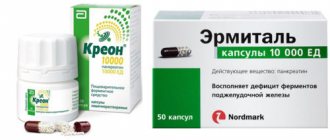Instructions
Deterioration of the excretory (exocrine) function of the pancreas leads to impaired absorption of food and a lack of basic macro- and microelements. Enzyme deficiency is manifested by pain, nausea, diarrhea and other unpleasant symptoms.
To compensate for enzyme deficiency, Festal or Creon, as well as other pancreatin-based products, are prescribed.
How do they affect the body?
The main active component of Festal and Creon is an extract of pancreatic juice of pigs or cattle - pancreatin. It consists of 3 types of enzymes: lipase, which determines the dosage of all enzyme preparations, amylase and proteinases.
The first of the enzymes is responsible for lipolysis (the breakdown of fats) and the absorption of fat-soluble vitamins in the intestines. Amylase helps break down starch into monosaccharide residues (simple carbohydrates), which are sources of energy. Proteinases ensure the absorption of amino acids from proteins.
With exocrine pancreatic insufficiency, fats, proteins and complex carbohydrates are not completely digested. This leads to hypovitaminosis A, E, K and D3, gastrointestinal disorders and weight loss. It is possible to improve the absorption of macro- and micronutrients only by introducing additional sources of enzymes (Creon, Festal).
Pharmacological effects
Creon capsules dissolve under the action of gastric juice and release many mini-spheres with an enteric coating. The same shell protects units of the drug Festal.
When the drugs reach the intestines, the coating dissolves and releases proteases, lipase and amylase. They break down incoming nutrients and ensure their absorption in the small intestine.
Festal additionally contains hemicellulase, bile extract and bile acids. Hemicellulase partially breaks down fiber, which helps reduce gas formation in the intestines. Bile components stimulate the secretion of bile and its own lipase, which facilitate the absorption of fatty acids.
What is the difference
Creon promotes better absorption of nutrients in the small intestine and the breakdown of proteins, lipids and carbohydrates. Festal stimulates digestion due to its choleretic effect. This is necessary when pancreatitis is combined with congestion in the gallbladder, which occurs in most cases. The drug also stimulates the breakdown of plant fiber, which reduces the risk of increased gas formation.
Creon promotes better absorption of nutrients in the small intestine and the breakdown of proteins, lipids and carbohydrates.
Differences and similarities between the two drugs
The differences between Creon and Festal are observed in the following:
- Dosage of enzymes. The enzyme content in Creon is higher than in Festal. At the minimum dosage of lipase in the drug Creon (10,000 units), the content of amylase and proteases is 8,000 units and 600 units. For Festal, the concentration of these enzymes is 6000 IU, 4500 IU and 300 IU, respectively.
- Availability of additional components. The effect of Creon is based only on the pharmacological effects of pancreatin, and Festal additionally contains hemicellulase and bile extracts.
- Release form and particle sizes of the drug. Creon is available in the form of capsules (the shell is soluble in gastric juice) filled with microspheres with pancreatin. Festal is supplied in the form of dragees with an acid-resistant coating.
- Number of contraindications. Festal has a greater number of indications: additional components of this medicine can cause exacerbation of other gastrointestinal diseases.
- Cost of medicine. The price of Creon (in the minimum dosage) is 2-2.5 times higher than the cost of Festal.
Which is better: Festal or Creon?
| A drug | Advantages | Flaws |
| Creon | Several dosage options Use for children, pregnant women, patients with liver dysfunction, etc. Possibility of dividing small doses of enzymes if necessary | High cost Presence of side effects when taking high doses of lipase |
| Festal | Use for disorders of the formation and movement of bile, certain liver diseases Lower dosage of enzymes (convenient dosage regimen for preventive purposes) Low cost | Less uniform distribution in the intestines, reduced effectiveness More contraindications and adverse reactions Inability to use for children under 3 years of age and patients with swallowing disorders |
What's better?
The choice is based on the doctor’s recommendations, which are based on a study of the characteristics of the body, the course of the disease, the desired effect, the study of contraindications, etc.
Most often, patients use Creon, since according to reviews it provokes a minimal number of unpleasant side effects, has significant activity, and is easy to use. Doctors recommend using it in the treatment of pancreatitis, various diseases that are associated with the lack of normal functioning of the pancreas. Actively used in pediatrics.
The relevance of Festal is no less significant. It is used as an “assistant” in the digestion of unusual food, and is actively used when preparing the patient for further studies of the gastrointestinal tract. It is used in complex therapy with antibiotics and fat-soluble vitamins.
Medicine and healthComment
Indications for use
Enzymatic agents are used for the following indications:
- enzyme deficiency in elderly patients, against the background of chronic pancreatitis, cystic fibrosis and Shwachman-Diamond syndrome,
- malignant neoplasia of the pancreas and bile ducts,
- condition after irradiation or complete or partial removal of the stomach, gall bladder, pancreas,
- other gastrointestinal diseases that complicate the function of the digestive gland (cirrhosis, gastrostasis, cholestatic inflammation of the liver, etc.),
- excessive microbial growth in the small intestine,
- pain under the left ribs, heaviness in the abdomen, nausea and diarrhea due to poor nutrition,
- preparation for radiography or ultrasound of the abdominal organs.
The following pathologies may be indications for taking Festal:
- disturbances in the movement of bile (with GIB, malabsorption, etc.),
- disorder of neurohumoral regulation of the formation and separation of bile in chronic gastrointestinal diseases (gastritis, gastroduodenitis, cholecystitis),
- alcoholic and toxic liver damage.
For cystic fibrosis and digestive disorders during pregnancy, Festal is used with caution.
Reviews from doctors
Elena (therapist), 43 years old, Yekaterinburg.
Festal is an effective enzyme agent. It improves digestion and is prescribed in the preparatory period before a planned ultrasound examination or x-ray. The therapeutic properties of the drug make it possible to include it in the treatment of a wide range of pathological conditions of the digestive system.
The medicine is well suited for eliminating digestive problems in the 1st trimester of pregnancy. Festal helps reduce the process of gas formation in the intestines and prevents constipation from developing. The disadvantages of the enzyme agent include a number of contraindications that should be taken into account.
Oleg (gastroenterologist), 34 years old, Tula.
Creon is an excellent enzyme preparation that includes pancreatin. The product is simply irreplaceable in eliminating problems with the pancreas. The drug has virtually no side effects, allergic reactions to its components are rare. I consider its high price to be one of the most significant drawbacks. Before using the medicine, you must consult your doctor.
Enzyme medicine should be selected individually in each case by the attending physician.
Directions for use and dosage
Enzymatic agents are taken during or after meals. 1/3-1/2 doses can be taken immediately before meals, if the number of units of medication is more than 1. Capsules and dragees are swallowed whole, with plenty of water.
For hypofunction of the digestive gland, the dose of Creon is from 25,000 to 80,000 units (calculated for lipase). This corresponds to 2-8 capsules depending on the dosage.
For cystic fibrosis, the daily dose of medication is selected according to age and weight: for patients under 4 years of age, the recommended initial dose is 1000 IU of lipase per 1 kg of body weight, for patients over 4 years old - 500 IU per 1 kg. If clinical improvement is unsatisfactory, the dosage is increased (but not more than 10,000 units/kg).
Festal is prescribed in a dose of 1-2 tablets 3 times a day throughout therapy. To prepare for the study, it is recommended to drink 2 tablets 2-3 times a day for 2-3 days before the procedure.
Which is better - Festal or Creon?
The successful dosage form and optimally selected composition of Creon make it more effective in eliminating problems with insufficient functioning of the pancreas.
But some differences in the composition of drugs can cause a different reaction of the body to taking one or another drug.
Therefore, the enzyme medicine should be selected individually in each case by the attending physician.
[morkovin_vg video=”h_mWj8S7A9Q,Festal;Yj9c5MP_bsQ,Creon”]
special instructions
Products based on enzymes and bile are prescribed taking into account the age and health status of the patient.
Pregnancy and lactation
Prescribing both drugs during pregnancy is possible only if the benefit to maternal health is significantly higher than the risk of problems in the fetus. Large doses of enzymes (Creon) can negatively affect the absorption of vitamin B9 and iron, which are necessary for the growth and development of the child.
Pancreatin does not have a toxic effect on the body of a newborn during lactation.
Childhood
The use of both drugs to treat children is acceptable. Therapy should be carried out in accordance with the prescriptions of a gastroenterologist or pediatrician. When taking pancreatin in high doses, children may develop constipation and perianal irritation.
Dragee Festal is prohibited for use in children under 3 years of age.
Elderly age
Creon is used to treat patients over 60 years of age without dose adjustment due to chronic pathologies of internal organs.
Festal is not prescribed to patients with liver failure, cholelithiasis and a number of other pathologies that can be observed in older people.
For swallowing disorders in young children, bedridden and elderly patients, Creon capsules should be opened and microspheres added to soft food or acidic drinks - yogurt and juice (with a pH less than 5.5). It is prohibited to divide and crush the dragees.
Contraindications to the use of Festal and Creon
General contraindications to taking Festal and Creon are:
- acute pancreatitis,
- exacerbation of inflammation of the pancreas,
- individual sensitivity to the components of the drug.
Festal is also contraindicated in the following pathologies:
- liver failure, chronic inflammation (hepatitis), precoma and coma of the liver,
- high concentration of bilirubin,
- obstructive jaundice, empyema and gallstones,
- intestinal obstruction, diarrhea,
- peptic ulcer and erosion of the stomach and duodenum,
- duodenogastric reflux.





